Changing the narrative for diabetes in pregnancy
Since 1987, Ohio State’s Diabetes in Pregnancy Program has pioneered advancements to improve outcomes for thousands with type 1, type 2 and gestational diabetes.
In the summer of 2022, Marisa Ray-Gooden was elated to discover she was pregnant after four years of unexplained infertility. She was also acutely aware of the risks involved. “I’ve been chronically ill with several serious medical conditions for more than 20 years,” she explains. She was diagnosed with Ehlers-Danlos syndrome, a condition that affects connective tissues in the body, only a month before becoming pregnant, and has also lived with lymphedema for years.
Ray-Gooden’s pregnancy was uneventful until she was diagnosed with gestational diabetes in the second trimester. At the rate her son was growing, her doctor worried he would be born weighing more than 11 pounds.
To better manage her condition throughout pregnancy, she was referred to Kartik Venkatesh, MD, PhD, a maternal-fetal medicine (MFM) specialist who serves as the director of the Diabetes in Pregnancy Program at The Ohio State University Wexner Medical Center.
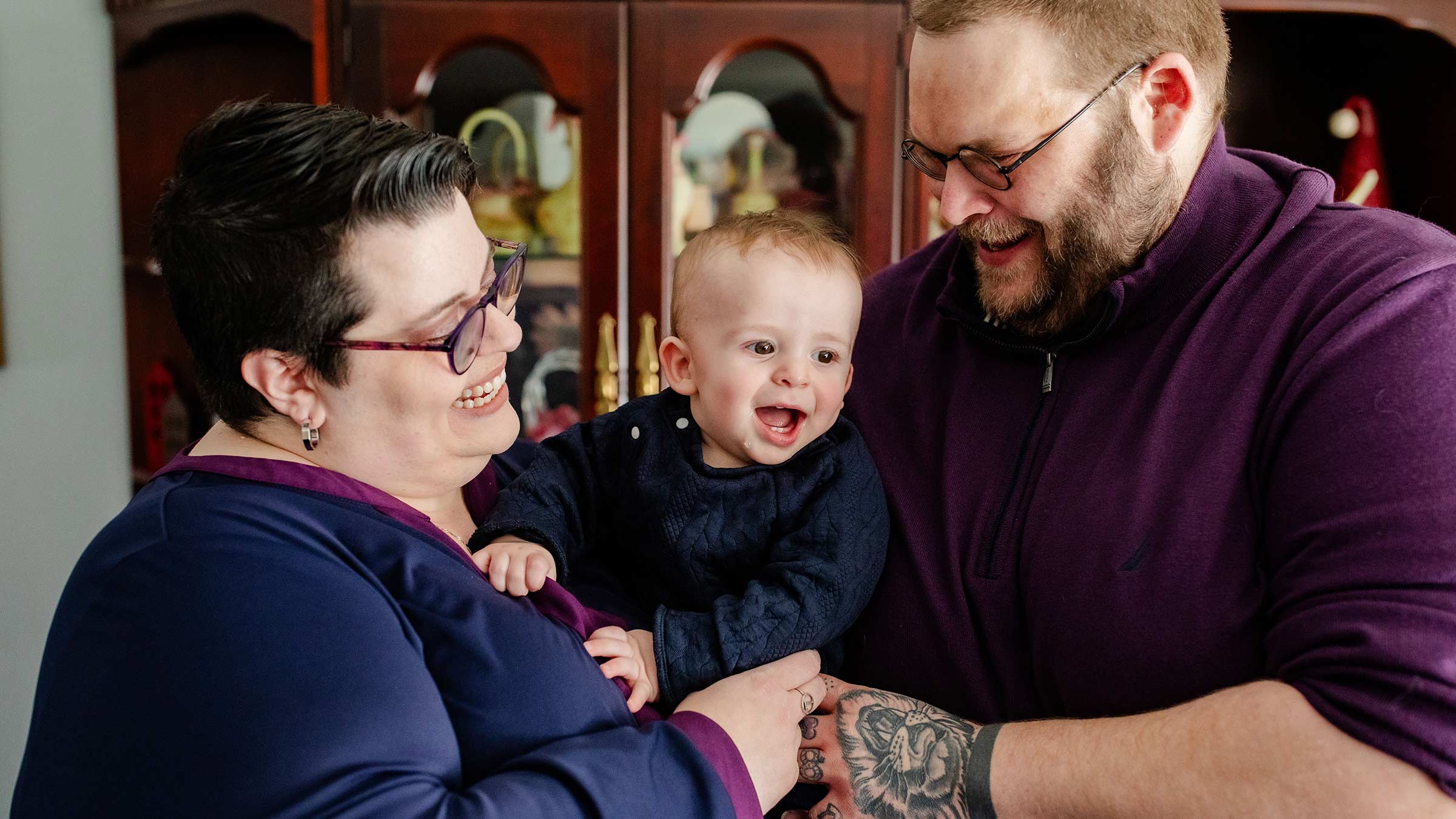
40 years of progress
Established in 1987, Ohio State’s Diabetes in Pregnancy Program treats patients with type 1, type 2 and gestational diabetes. No matter what type of diabetes they have, how long they have had it, or how much it impacts their daily life, these patients are more likely to develop preeclampsia, experience preterm birth or stillbirth, have a baby that is too large or too small or have a cesarean delivery. They also face a significant increase in the rate of miscarriage and fetal malformations if their blood glucose is not well controlled. And even after a safe delivery, a large baby whose birth parent has diabetes is more likely to develop diabetes later in life.
“Anything that can go wrong in pregnancy is more likely to go wrong in patients with diabetes,” says Steven Gabbe, MD, Professor Emeritus of Obstetrics and Gynecology and CEO emeritus of the Ohio State Wexner Medical Center.
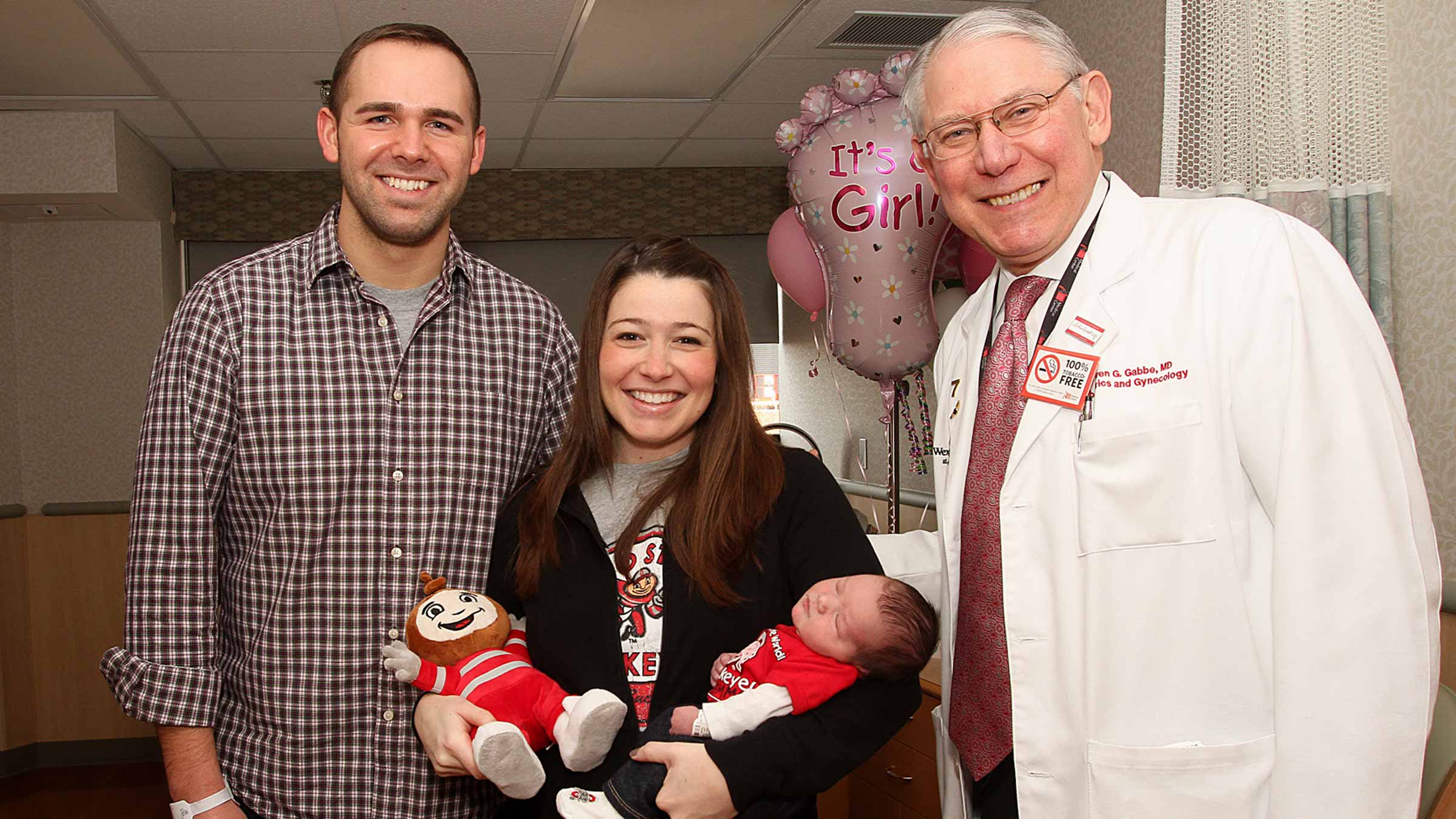
Dr. Gabbe, who was diagnosed with type 1 diabetes during medical school, is both a contributor to and a recipient of the extraordinary advancements in diabetes care over the past 50 years.
When he first entered practice, diabetes care for pregnant patients with type 1 diabetes required hospitalization for the final weeks of pregnancy, for there was no other way to monitor a patient’s blood glucose. The early 1980s saw the introduction of self-monitoring of blood glucose with blood samples from a finger prick, and insulin pumps developed in the mid-1990s more closely duplicated the body’s natural secretion of insulin. In another leap forward, continuous glucose monitors entered the market around 2010. Instead of pricking their finger seven or eight times a day, patients can have a monitor inserted under their skin that produces a new glucose measurement every five minutes and communicates the number with their insulin pump.
Dr. Gabbe trained at Boston’s Joslin Diabetes Center, which pioneered an approach that improved the success rate for women with diabetes giving birth to healthy babies from 54% to more than 90%. After replicating the program at the University of Pennsylvania, where he led the Division of Maternal-Fetal Medicine (MFM), Dr. Gabbe brought it to Ohio State. In partnership with Mark Landon, MD, a former resident and fellow who became his first recruit to the program, Dr. Gabbe founded what is now one of the oldest and largest diabetes and prenatal care programs in the United States.
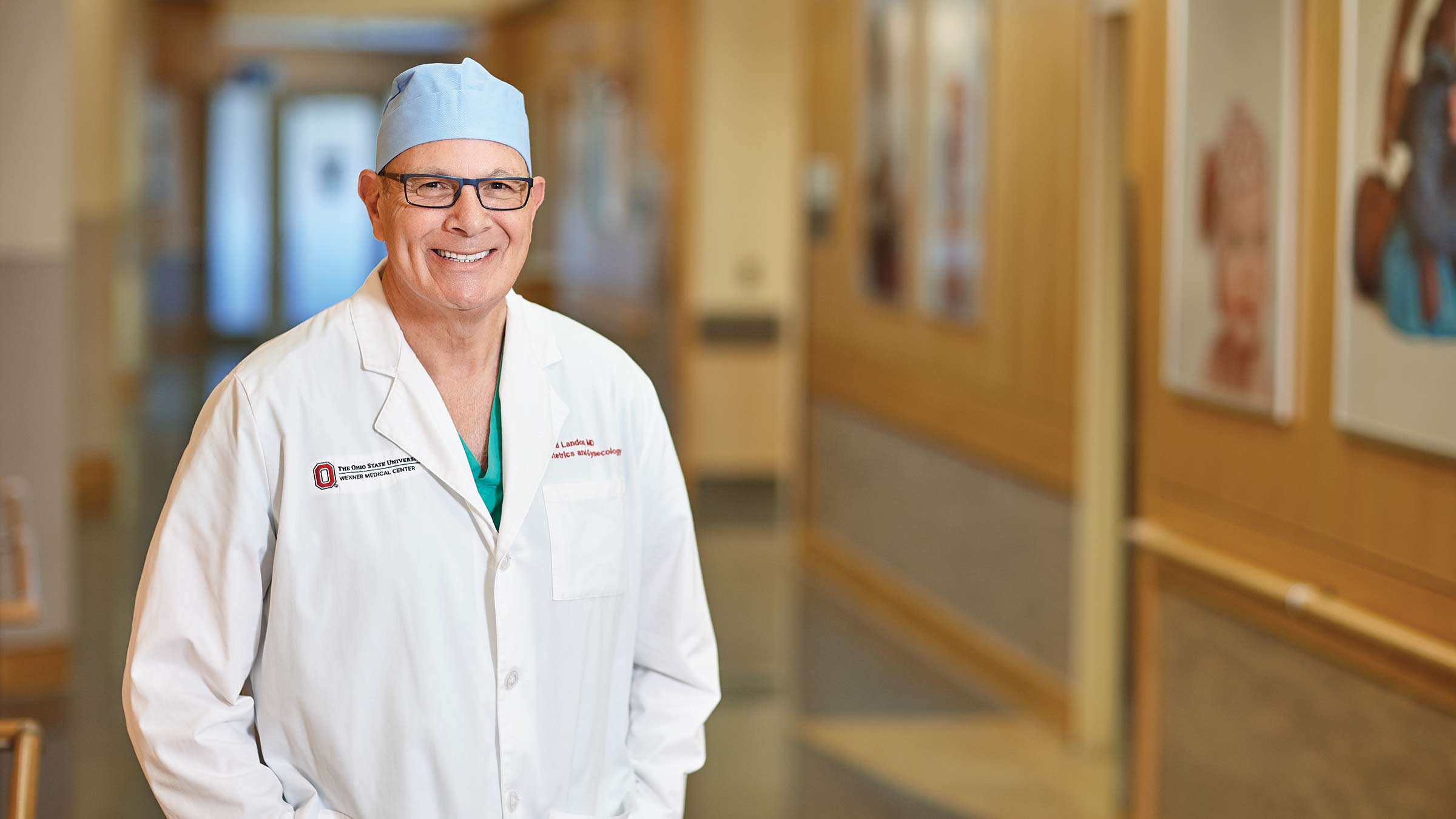
“Today, virtually every academic medical center in the United States has a diabetes in pregnancy program, but back then, there were only four or five programs,” recalls Dr. Landon, who now serves as the Richard L. Meiling Chair of Obstetrics and Gynecology at The Ohio State University College of Medicine. “While great strides had been made to improve care, we knew there was significant ground left to cover.”
Advancing care for diabetes in pregnancy
Drs. Landon and Gabbe drew upon the resources of the Ohio State Wexner Medical Center to assemble a large bench of experts to tackle diabetes from all fronts.
- MFM doctors and nurses take the lead, accepting referrals from obstetricians, midwives and community health centers across central and southern Ohio.
- Diabetes nurses educate patients about managing their condition, from recognizing signs of hypoglycemia to using their continuous glucose monitors correctly.
- Dietitians provide meal planning guidance to help patients achieve a balanced, low-glycemic diet.
- Social workers address the nonmedical factors that impact patient outcomes, often referred to as social determinants of health.
“Social determinants of health significantly influence patient outcomes,” says Dr. Gabbe. “If a patient lacks access to insulin, healthy food or opportunities to exercise, for example, she is far more likely to have an adverse pregnancy outcome.”
Together, the team runs a Diabetes in Pregnancy Clinic that operates five days a week. This clinic provides comprehensive care for approximately 30 patients living with diabetes per day, all of whom meet with each team member and leave with a personalized treatment plan. While one patient may prefer a continuous glucose monitor, another may need to take insulin. Still others, particularly those with gestational diabetes, may treat their condition with diet and exercise.
“We focus on the patient as an individual, not as a blood sugar. What works for one patient may not work for another,” Dr. Gabbe says.
Over the past five years, patient volume has nearly doubled with a care model that increasingly emphasizes keeping as much of the patient’s care with their local physician as possible. Patients come to Ohio State for high-risk diabetes care while continuing to receive prenatal care from their local Ob/Gyn and delivering at their local hospital.
‘Moving the mark’ for pregnant patients with diabetes
In 2014, the team welcomed Elizabeth Buschur, MD, an endocrinologist who founded the Endocrine Disorders in Pregnancy Program at Ohio State. Dr. Buschur joins the Diabetes in Pregnancy Clinic several times a week to counsel patients — primarily those with type 1 diabetes — on the specific insulin and technology they may need to maintain stable blood glucose throughout their pregnancy.
“I have always been inspired by what our patients are willing to do to keep their unborn child safe and healthy,” Dr. Buschur says. “Many of them have experienced less-than-optimal glucose control in the past, and within a few weeks, we can move the mark for them.”
In 2020, Dr. Landon recruited Dr. Venkatesh, an epidemiologist as well as an MFM specialist, to take the Diabetes in Pregnancy Program to the next level.
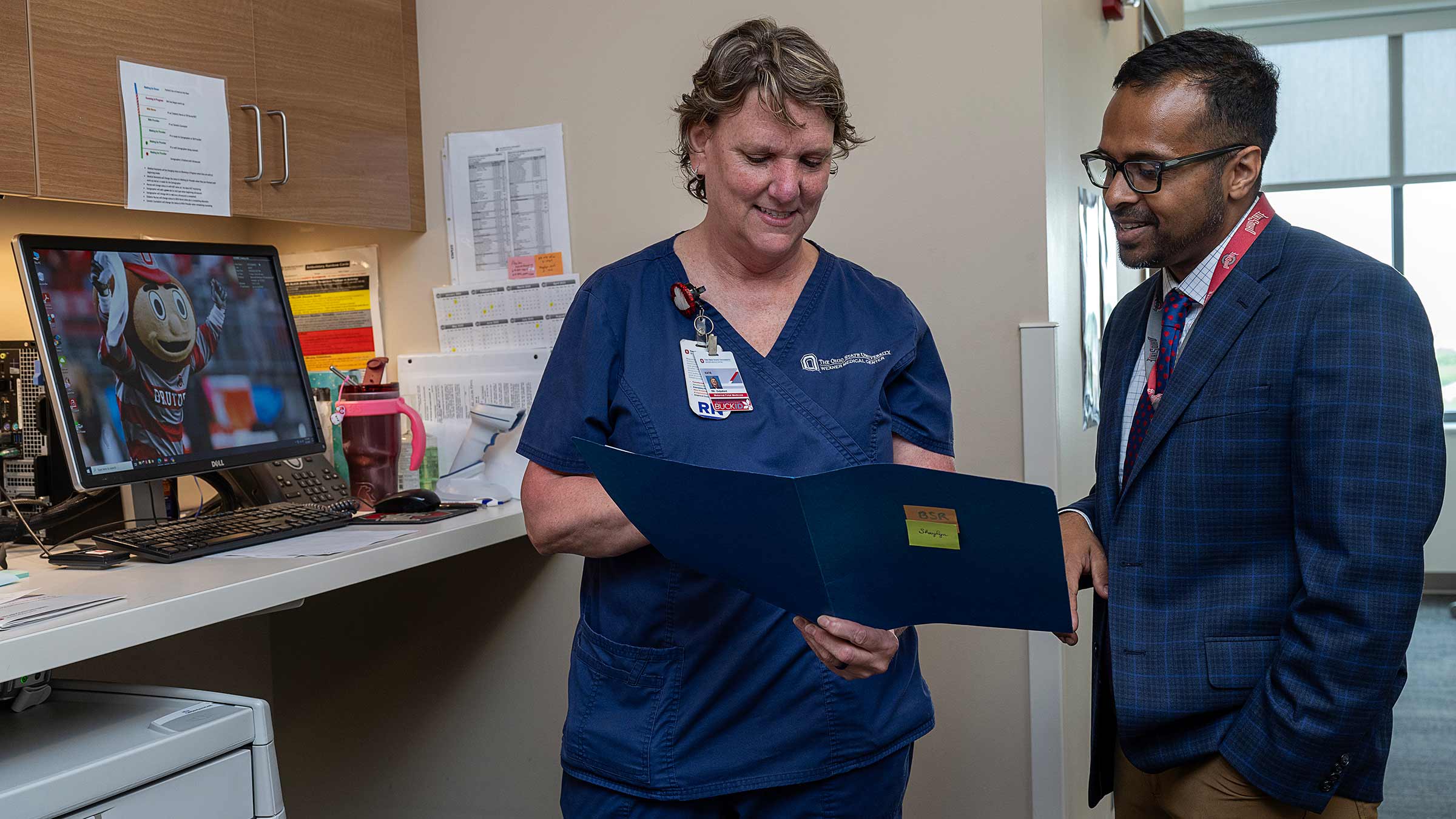
“Dr. Landon and the team recognized that providing the best possible clinical care depended on access to the best treatments, best ideas and best protocols,” Dr. Venkatesh says. “That requires active engagement in the research space. I’m passionate about using data to improve outcomes for our patients.”
For the past five years, Dr. Venkatesh has shone light into the “black box” of pregnancy, where there has historically been scarce data related to conditions like diabetes.
Research that matters for gestational diabetes
Dr. Venkatesh is building on the research foundation laid by Dr. Gabbe and Dr. Landon with large, federally funded trials like the DECIDE study, which compares the use of metformin and insulin in treating gestational diabetes. Through this study, which will enroll more than 1,500 women across 20 sites over the next three years, he and Dr. Landon are leading the effort to understand the most effective treatment strategies.
Another ongoing, National Institutes of Health–funded trial called ACHIEVE examines glucose control for high-risk patients with type 2 diabetes. Through the trial, Dr. Venkatesh and his research team are examining the impact of a mobile app, access to community health care workers and other technology interventions designed to improve pregnancy outcomes.
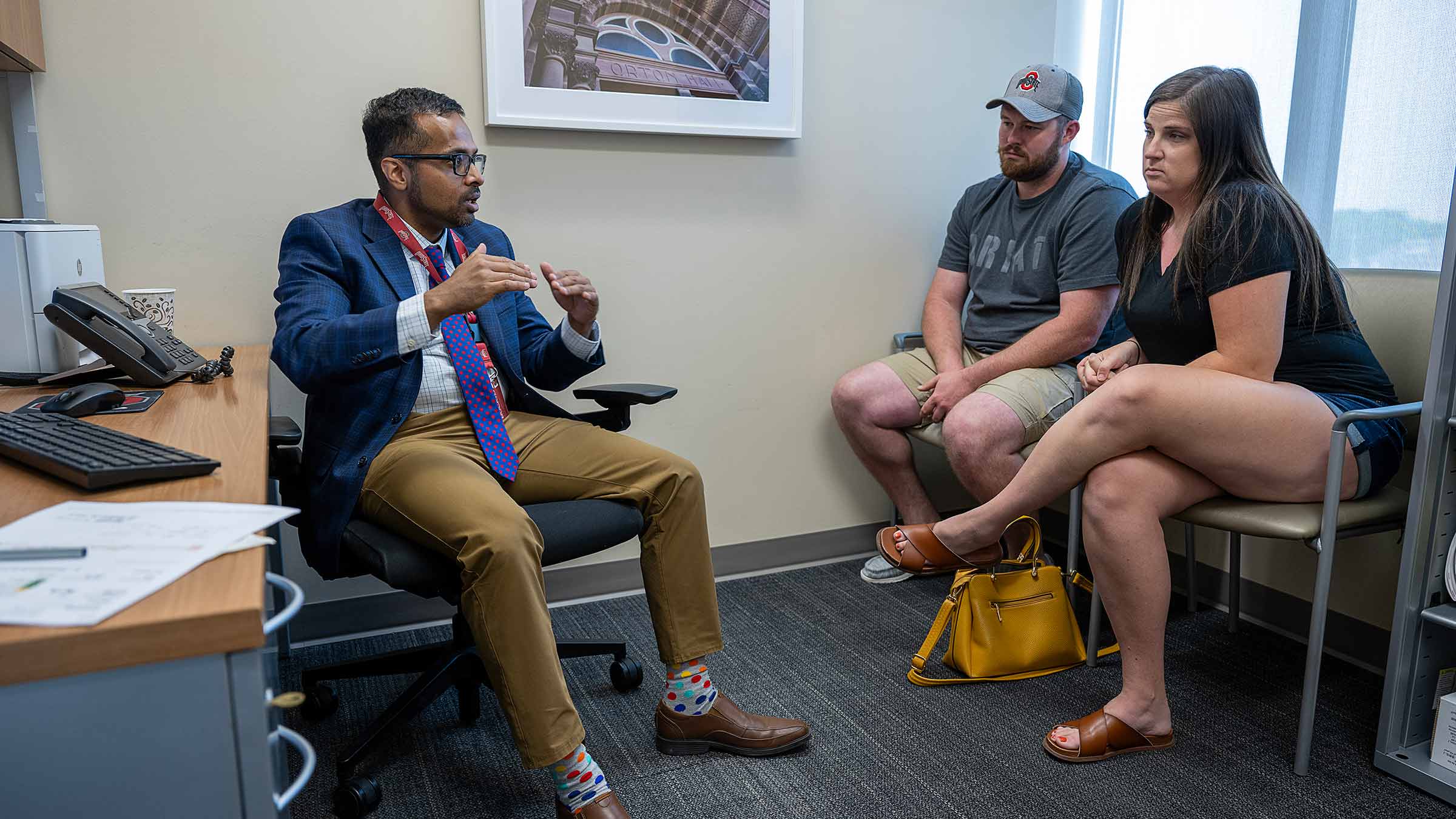
DECIDE and ACHIEVE are only two of many ongoing studies that examine the most pressing clinical questions at the intersection of pregnancy and diabetes. The Diabetes in Pregnancy team has used research findings to progressively lower the rate of cesarean deliveries, neonatal intensive care unit admissions, preeclampsia and preterm birth among their patient population.
When Marisa Ray-Gooden first saw Dr. Venkatesh, she was relieved to find someone as committed to the health and safety of her baby as she was. He gave her a nuanced understanding of her options, which in her case included metformin and insulin. Under his care, Ray-Gooden delivered a healthy baby at 38 weeks of gestation. Now, two years after her son’s birth, she takes metformin to help regulate her blood glucose, while her son has not experienced any effects from her condition.
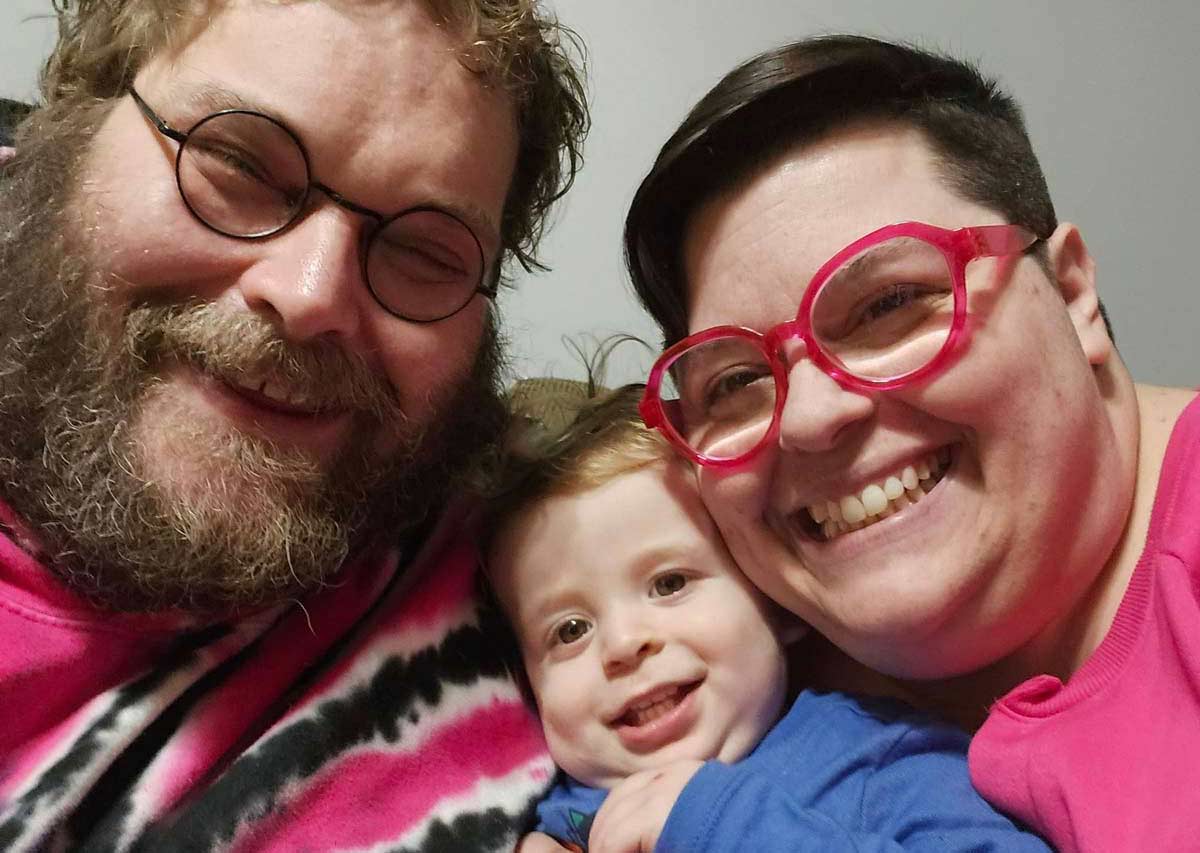
“Given my medical history, I needed a top-tier person I could trust. Dr. Venkatesh cared about us and knew what he was talking about,“ Ray-Gooden says.
Next frontiers in diabetes and pregnancy
The Diabetes in Pregnancy team will continue to study the rapidly evolving technology surrounding the care of diabetes, recognizing that technology is only part of the solution. They also aim to improve both prepregnancy care and postpartum support to improve outcomes for parents and babies. Meanwhile, integrating better at-home care in every stage of pregnancy will make a measurable difference for a diverse population.
“We will continue to do whatever it takes to ensure that every patient with diabetes has a successful pregnancy and healthy baby,” Dr. Landon says. “After all these years, that is still what drives us.”

Supporting the healthiest pregnancies possible
Learn more about the Diabetes in Pregnancy Program.
Learn more and request an appointment




